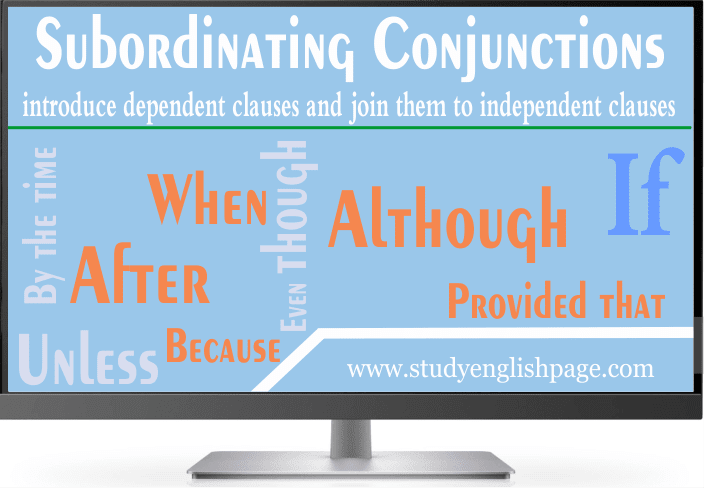Subordinating Conjunctions
Definition of Subordinating Conjunction
A subordinating conjunction is a connecting word that introduces a dependent clause and joins it to an independent clause. Subordinating conjunction connects unparalleled sentence structures.
- Don't tell him unless you are asked.
- While I was reading a book, they remembered my homework.
General Features of Subordinating Conjunctions
- A subordinating conjunction is used in a sentence that includes two clauses. One of the clauses must be dependent.
- A subordinating conjunction comes at the beginning of a dependent clause in a sentence whether the dependent clause comes first or is followed by the main clause.
- A subordinating conjunction adds to the meaning of a sentence by connecting two ideas.
- In most cases, a subordinating conjunction is followed by a dependent clause. The order of clauses doesn’t matter.
Subordinate Clause
A clause that begins with a subordinating conjunction is called a subordinate clause.
A subordinate clause contains two qualities. The first one is that it does not give a complete thought. It can’t stand alone as a sentence. The second quality of the subordinating conjunction is that it depends on another clause (Independent clause).
Does a subordinate clause emphasize?
A subordinate clause can be used first as well as second. Emphasis is placed on the clause which comes second.
List of Subordinating Conjunctions
After | Although | As |
Because | Before | By the time |
Even if | Even though | If |
In case | Not that | In order to |
Provided that | Rather than | Since |
So that | Than | That |
Though | Unless | Until |
When | Whenever | Where |
Whereas | Wherever | Whether |
While | Why |
|
Categories of Subordinating Conjunctions
As discussed earlier, subordinating conjunctions link dependent clauses and independent clauses. Apart from this, they are categorized based on their meanings. The following are the categories of subordinating conjunctions.
Time
Subordinating conjunctions related to time show the time of one clause in relation to another. These conjunctions include after, as soon as, before, once, still, until, when, whenever, and while.
- She asks whenever she gets confused.
- While I was reading a book, they remembered my homework.
- She was taken to the hospital by the time I reached the place of the accident.
Concession
Concession conjunctions are used to provide additional information about obstacles or hindrances. They include although, even though, and as though.
- We went out even though it was so hot.
- Although I was not fine, I took all the classes in school.
- As though it was so dark, we walked for an hour.
Comparison
Comparison-related conjunctions are used to establish correlation by providing context or compare ideas by providing context. These conjunctions include just as, though, whereas, in contrast to, while, and similarly.
- Ali prefers riding, whereas I prefer driving a car.
- I was composing my notes while my brother was watching T.V.
- Just as he entered the room, I pretended to have an emergency call.
Cause
Cause-related conjunctions are used to show cause and effect within a sentence. They are used to provide a reason for an activity in the main or independent clause. They include as, because, in order that, since, and so that, hence.
- I did not attend take my class today because I was not feeling well.
- They come early so that they can get the best seats.
Condition
Condition conjunctions provide conditional scenarios. We use them to show that the independent clause relies on the information found in the dependent or subordinate clause. They include if, even if, in case, provided that, and unless.
- Don’t tell him unless you are asked.
- If they get time, they will visit us.
- Provided that there is enough space, everyone will have his seat.
Place
Subordinating conjunctions related to place tell the place of an action where it takes place. They include where, whereas, and wherever.
- You will not find them wherever there is a rush of people.
- They will not visit a place where they don’t have something to eat.
Manner
Subordinating conjunctions related to manner show how the action is performed. They include as if, and as though.
- John ran fast as though someone was chasing him.
- He studied as if he will no longer live without studying English.
Punctuating Subordinating Clause
A subordinating clause must be followed by a comma when it comes first. When it comes after the main clause, you don’t need to use a comma. We don’t use commas before subordinating conjunctions.
- If it rains, it will become a little cooler.
- It will become a little cooler if it rains.
Placement of Subordinate Conjunctions
A subordinating conjunction introduces a subordinate clause; consequently, it is used at the start of the subordinate clause.
Relative Pronouns vs Subordinating Conjunctions
A relative pronoun is defined as a word that introduces a dependent clause in a sentence. Same as subordinating conjunctions, the relative pronoun is used at the beginning of the dependent clause. Although relative pronouns look similar to subordinating conjunctions, they are completely different.
The main difference is that relative pronouns like who, which, and that act as the subjects of dependent clauses.
On the other hand, subordinating conjunctions don’t act as the subjects of dependent clauses. They are followed by the subjects of dependent clauses.
- I meet the teacher who teaches you.
Here, ‘I meet the teacher’ is the independent clause. ‘Who teachers you’ is the dependent clause. The word ‘Who’ acts as the subject of the verb ‘teaches’.
- While we were eating, some guests knocked at the door.
In this example, each clause has its subject. The subordinating conjunction ‘While’ does not act as the subject of the dependent clause.
Relative Adverbs as Subordinating Conjunctions
Relative adverbs (when, where, when) introduce adverb clauses. We can call them a type of subordinating conjunctions. They add more about the place of action.
- When they arrived, we greeted them with a smile.
- Go again to the place where we went yesterday.
- Tell me the reason why you failed the test.
EFFORTLESS ENGLISH COURSES
1/ PRONUNCIATION COURSE
Start Improving Your Pronunciation!
In this course, I promise to help you develop an American accent.
I AM EXCITED TO HELP YOU ACHIEVE THE HIGHEST LEVEL OF SUCCESS WITH YOUR ENGLISH SPEAKING! READ MORE
I WANT TO LEARN HOW TO SPEAK WITH AN AMERICAN ACCENT NOW!
JOIN NOW FOR ONLY $49.99
2/ Original English Course










0 Comments